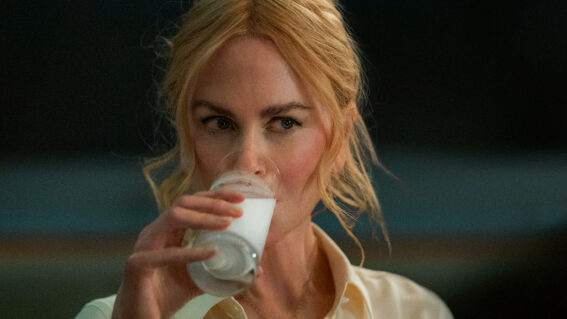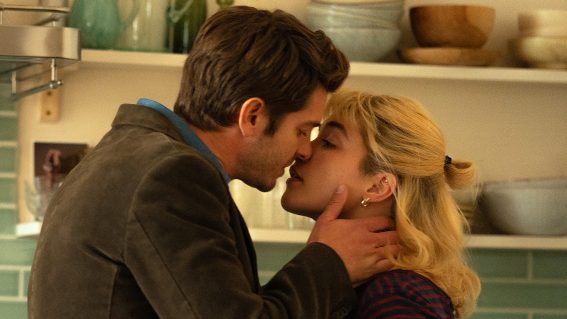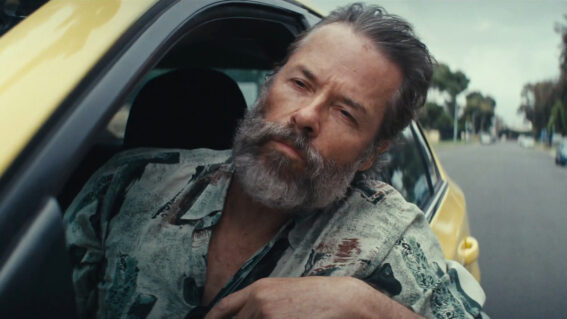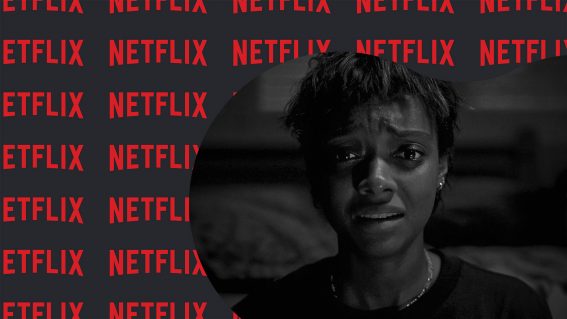Mrs Davis is an ingenious yarn of faith vs. AI that’ll bring you to your knees

Each new moment of Mrs Davis reveals another layer of holy unpredictability: and Eliza Janssen has high hopes for this week’s finale. Here’s why you should be watching.
It took an episode-and-a-half for Mrs Davis to make me a believer. Creators Damon Lindelof and Tara Hernandez are known respectively for shows like The Leftovers (which I love deeply) and The Big Bang Theory (which I…have seen). With the added, hyper-expressive powers of star Betty Gilpin (of the cruelly cut-short Netflix series GLOW), would their collaboration merely wind up as a self-consciously quirky miniseries, about how folks today are too obsessed with their dang devices?
Once the titular AI entity sends Sister Simone (Gilpin) off on a reluctant quest for the Holy Grail, episode two takes a little more time to explain the nun’s romance with a mysterious chef. In moments of immense spiritual and physical danger, she’s somehow transported to his diner, where he makes her falafels, tells her everything’s going to be alright. That’s when we get a reveal that confirmed to me that I would watch every moment of Mrs Davis with delight: “Jay”, played with smouldering sweetness by Andy McQueen, is actually “JC” himself.
Our main character is a nun literally married to Jesus Christ, and Lindelof and Hernandez have forced us to take his in-world existence (and sacrilegeous, husband-material hotness) at face value.
Compared to the weighty morality of Lindelof’s past series like Lost and Watchmen, Mrs Davis is a far more breezy, minor work. The unbelievable Jay reveal is soon played for love-triangle laughs, with Simone unsure whether she’s liturgically cool to hook up with her ex and current grail-quest companion Wiley (Jake McDorman). Each episode sends the pair off on a globe-trotting shaggy dog story, from duelling religious sects to whale-hunting side-missions and sinister sneaker commercials. It’s all wildly unpredictable, anchored by Gilpin’s hilarious reactions to each new bit of nonsense. And yet there’s an earnest interrogation of how faith—in systems of belief both old and intimidatingly modern—can change us in Mrs Davis, a whimsical sense of curiosity that I hope gets its final testament in this week’s finale.
As if the present-day adventure shenanigans weren’t enough to take in, Mrs Davis has also established a dense and wacky lore for its protagonists that I’ll be sad to say goodbye to. For Wiley, it’s a Fight Club-esque deconstruction of Western machismo: branded a rodeo failure, he’s a cowboy desperate to be validated by the artificial intelligence that rules his modern world. For Simone, flashbacks reveal the toxic relationship between her magician parents (Elizabeth Marvel and David Arquette!!), making her unlikely conversion to Christianity and bitter hatred of Mrs Davis plausible. Everyone’s desperate for guidance from some greater force, and with the introduction of further, even nuttier supporting characters, it becomes clear that parenthood is a motivating theme of the series. What kind of surreal bullshit might we accept, when our parents are kooks, our old beliefs have been left to grow dusty and obscure, and a new, all-knowing God whispers prophecies directly through our headphones?

I’ve written before about how uncomfortable I am with humanity’s growing confidence in AI. The other night at the pub, a friend asked ChatGPT to generate some fun trivia questions for us, and it came up with nonsensical sentences about events and people that don’t exist. When we requested “difficult Simpsons trivia question”, it asked us which character is best known for saying “D’oh!”. And in the past year, I’ve seen dull new shows and movies being criticised for their focus-group worshipping, AI-esque broadness. Travis Johnson complained that Prime Video’s Citadel felt like, as producers the Russo Brothers exuded would soon be possible, it was already being scripted by artificial learning systems: “If this is the future, it’s going to be a boring one.” I saw similar jabs for big projects like Ghosted, Red Notice, The Gray Man, etc. etc.
Which is why I think viewers who are sick of such rote, self-important genre stories should hack into Mrs Davis’ strange frequency. Beyond explicitly casting non-human thought as its mysterious antagonist, the show is also a loving embodiment of randomness, chaos, coincidence and magic: all those things that keep us human, even in the nuttiest of circumstances. Antipodean viewers might raise an eyebrow at Chris Diamantopoulos’ ludicrous Aussie accent as resistance leader JQ, but when he yells at an underling to load him up with Vegemite before diving from a plane (“mite me!”), you can’t deny the off-the-wall, comic-book-esque charm of such moments.

The series mostly comes off as agnostic, giving a sardonic shrug to organised religion and a proud middle finger to our misplaced faith in machines: each episode is named by the screenwriters’ algorithm, resulting in laughably meaningless titles like “A Great Place To Drink To Gain Control Of Your Drink”. Whatever we learn about Mrs Davis’ true identity or motivation in the concluding eighth episode, I’m confident there’s no way I’ll see it coming—because the finale’s fate lies in the hands of very human characters and their very human, clever creators. Catch me praying for a happy ending to Sister Simone’s religious quest and power-fantasy love triangle. And perhaps one more AI-conducted singalong: episode seven ended with a bunch of strangers on a beach singing “Electric Avenue”, because it’s just that kind of show.



















